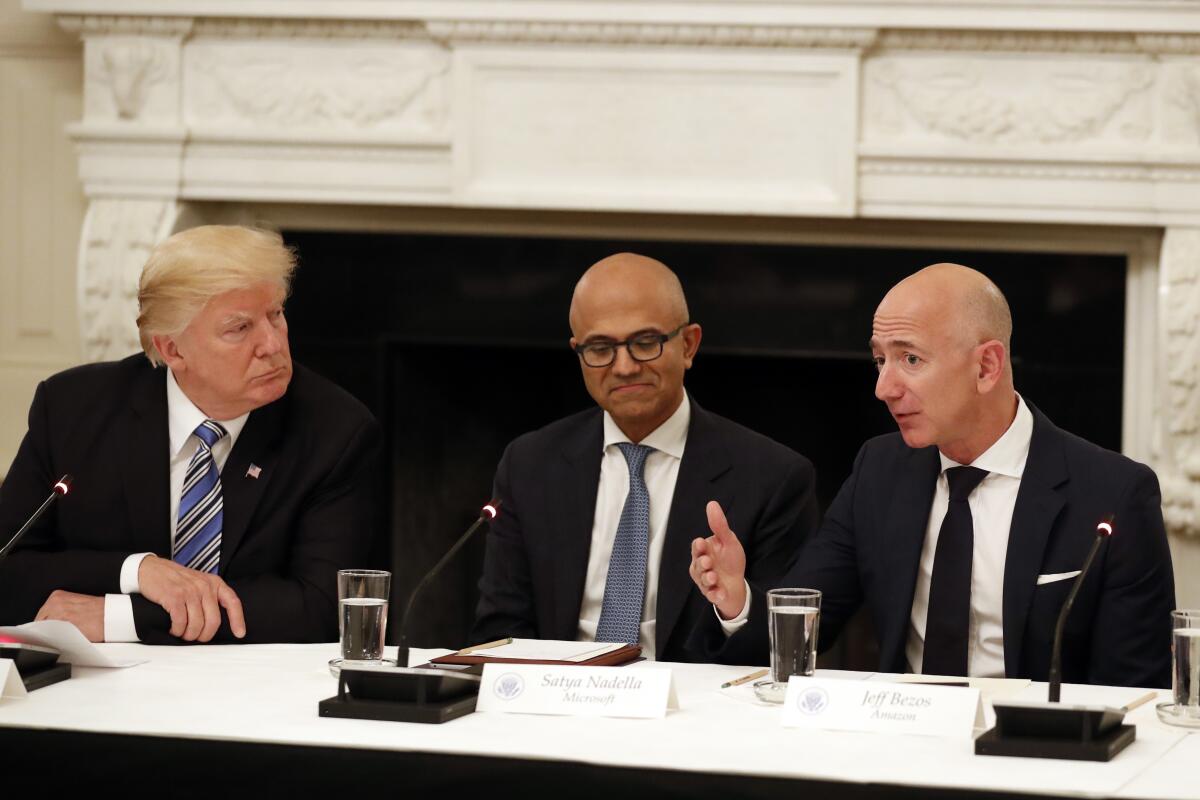Column: Amazon is right to say Trump tainted $10-billion Pentagon deal it lost

- Share via
It’s possible that the Pentagon had perfectly sound reasons for rejecting Amazon’s bid for a $10-billion high-tech contract and handing it to Microsoft instead.
But it’s also crystal clear that, as Amazon claims, we can’t know. That’s because President Trump openly interfered in the Department of Defense’s contracting process, placing the result under a permanent cloud.
“The question is whether the president of the United States should be allowed to use the budget of DoD to pursue his own personal and political ends,” Amazon says in its lawsuit over the contract. A redacted copy of the lawsuit, which was filed under seal in the U.S. Court of Federal Claims last month, was released Monday.
Good question.
If I become president, oh do they have problems.
— Donald Trump referring to Amazon, in February 2016
As it happens, Amazon’s accusation went public on the same day that the House Judiciary Committee began airing evidence about Trump’s alleged efforts to bend U.S. foreign policy to his personal interests by demanding Ukraine investigate the Biden family.
The issue raised by the Amazon case is similar — whether Trump compromised the national interest by forcing the Pentagon to accept Microsoft’s product when Amazon’s was better.
The Pentagon hasn’t responded to the Amazon lawsuit, but Microsoft has asked permission to intervene in the case as an interested party.
Before outlining Trump’s anti-Amazon machinations, a few words about the contract are in order. The product in question is known as the Joint Enterprise Defense Infrastructure, or JEDI. The goal is to vastly upgrade the Pentagon’s computing capabilities.
Among other features, the project would exploit cloud technology, in which data are distributed among secure servers rather than concentrated in physical locations. That’s a technology in which Amazon is an established leader. The company is asking the court to throw out the contract award and to order the Defense Department to reevaluate the bidding.
Because the contract is worth up to $10 billion, it attracted bids not only from Amazon and Microsoft but Oracle and IBM. The competition was fierce, and was waged not only in the halls of the Pentagon but in court.
Whole Foods throws hundreds of part-timers off its health plan, as Jeff Bezos reneges on his pledge to dump shareholder value managing.
Oracle filed a lawsuit in December 2018 contending that the procurement was compromised by three Pentagon officials’ conflicts of interest since two had previously worked for Amazon Web Services and the third was negotiating for a job with AWS while still at the Pentagon. A federal judge rejected Oracle’s claim in July.
Amazon asserts in its lawsuit that the superiority of its contract bid over those of its rivals is indisputable. The details, however, are hugely technical and for the most part remain redacted in the version of the complaint made public Monday.
What is indisputable is Trump’s effort to place his thumb on the scale.
Trump has made no secret of his hostility to Amazon or its founder and chairman, Jeff Bezos. His animus evidently derives from Bezos’ ownership of the Washington Post, which has been investigating Trump and his administration aggressively, going as far back as his early presidential campaign.
Trump has been pushing back all along the way. In 2016, for instance, he said at a rally: “If I become president, oh do they have problems. They’re going to have such problems.”
Conflating Amazon and the Washington Post as instruments of Bezos’ will (he owns the newspaper as a personal investment, not through Amazon), Trump regularly attacked the e-commerce giant. He targeted Amazon’s delivery contract with the U.S. Postal Service as an underpriced sweetheart deal. The Postal Service maintains that the contract is proper.
In July 2018, Trump tweeted that “the Amazon Washington Post has gone crazy against me.”
As the Pentagon’s procurement process continued, and it became increasingly likely that Amazon would be the victor, the company says, Trump intervened directly. Guy M. Snodgrass, a top aide to former Defense Secretary James Mattis, reported in his recent memoir “Holding the Line” that Trump called Mattis in the summer of 2018 and “directed Mattis to ‘screw Amazon’ by locking them out of a chance to bid” on JEDI.
Mattis refused, according to the book, which Amazon quotes in its lawsuit. “We’re not going to do that,” Mattis said in Snodgrass’ recollection. “This will be done by the book, both legally and ethically.”
Last July, Trump stated at a press conference that he had heard “tremendous complaints about the contract ... from different companies, like Microsoft and Oracle and IBM,” and said he would be asking the Pentagon “to look at it very closely to see what’s going on.”
Taking advantage of his prerogative to comment on issues of government about which he has no apparent knowledge, President Trump last week Twitter-attacked the U.S.
Under Mattis’ successor, Mark Esper, the company says, the procurement process was derailed, in part through Pentagon delays and demands for alterations in the bid. In October, after the contract already had been confidentially awarded to Microsoft, Esper announced he was recusing himself from the procurement process because his adult son had taken a job with IBM, creating a conflict of interest. IBM, however, had lost the bid months earlier.
Amazon is right to assert that, regardless of whether it deserved to win the contract, Trump’s actions muddied the process beyond recognition. As the company asserts, even if the contract officers had the best intentions in the world, it’s now impossible to know whether their actions were dictated by Trump, subject to subconscious or unconscious bias, or completely innocent.
Hanging in the balance is the credibility of the government itself, not to mention America’s interests. If Trump had national security at heart, he would have encouraged the Pentagon to find the best contractor for this vastly important job, and not inject his personal pride into the mix.
More to Read
Inside the business of entertainment
The Wide Shot brings you news, analysis and insights on everything from streaming wars to production — and what it all means for the future.
You may occasionally receive promotional content from the Los Angeles Times.












